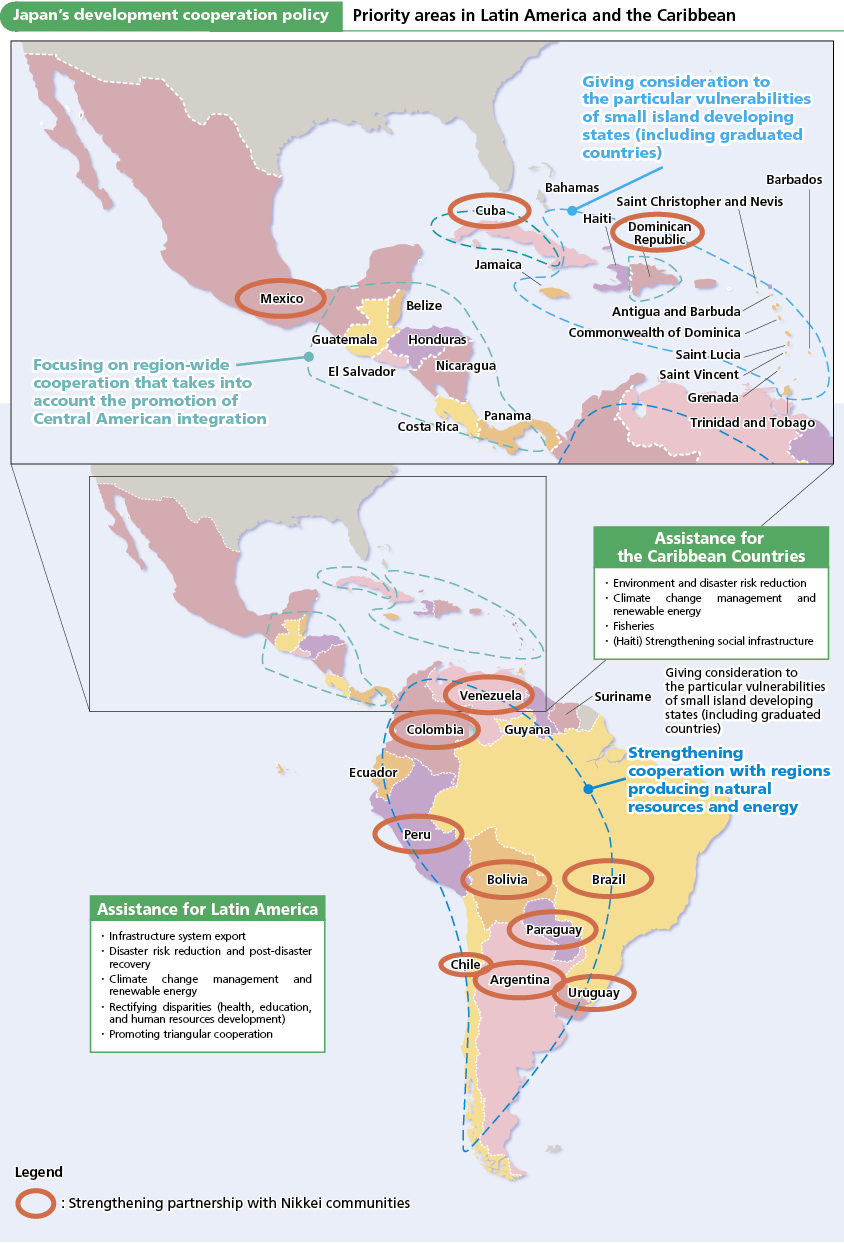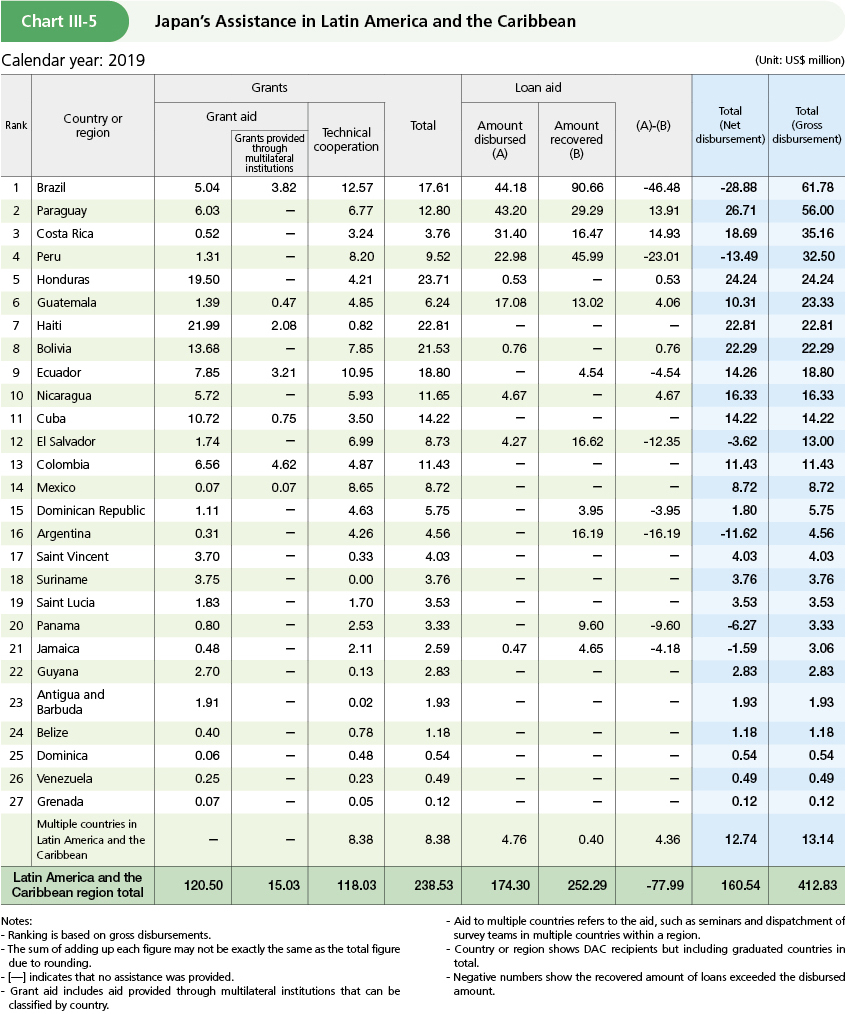4. Latin America and the Caribbean
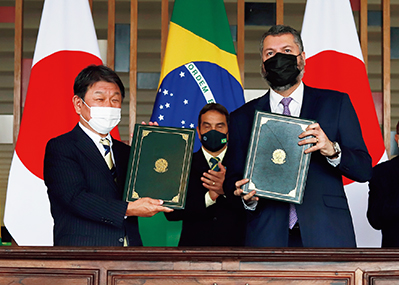
Foreign Minister Motegi attending the signing ceremony with Foreign Minister Araújo for the “Memorandum of Cooperation in the Field of Technologies Related to the Production and Use of Niobium and Graphene” and “Tomé-Açu Memorandum of Cooperation on the Sustainable Use of the Biodiversity of the Amazon” during his visit to Brazil (January 2021)
The Latin American and Caribbean region is an enormous market with a population of approximately 640 million and a regional GDP of approximately $5.5 trillion as of 2019 and is also a region of strategic importance for trade. This region has also consistently enhanced its presence in the international community through its rooted democracy and supply of mineral and energy resources as well as food resources. Although the average income level in the region is relatively high among ODA recipient countries, the region is characterized by significant disparities between the rich and the poor, as well as a large number of people who continue to suffer from poverty. Furthermore, this region has a traditionally strong personal and historical bond with Japan due to the community of Japanese immigrants and descendants (the Nikkei community) numbering more than two million. Japan has thus maintained stable and friendly relations with this region for a long period.
●Japan’s Efforts
... Efforts Toward Disaster Risk Reduction and Environmental Issues
While it is a region with a rich natural environment such as the tropical rainforests of the Amazon, the Latin American and Caribbean region is prone to natural disasters such as earthquakes, tsunamis, hurricanes, and volcanic eruptions. Therefore, Japan’s assistance for this region, utilizing Japan’s knowledge and experience in the field of disaster risk reduction, is of great importance.
Japan has provided a cumulative total of more than $320 million for recovery and reconstruction support to Haiti, which suffered catastrophic damage from the huge earthquake with a magnitude of 7.0 that occurred in 2010, as well as assistance that utilizes Japan’s expertise in the disaster risk reduction field to Caribbean countries and countries facing the Pacific Ocean including Chile, Ecuador, Mexico, and Peru, where earthquakes frequently strike. Japan has also provided emergency relief goods to Colombia, Guatemala, Honduras, and Nicaragua, which had suffered damage from hurricanes in November 2020.
Furthermore, the Project on Capacity Development for Disaster Risk Management in Central America named “BOSAI,” which aims to share knowledge on disaster risk reduction and reduce disaster risks at the local community level, has achieved significant results in the region. Moreover, for the Caribbean countries, Japan provides support from perspectives other than those based on per capita income, to overcome the unique vulnerabilities of small island developing states against climate change and natural disasters. In addition to developing disaster-resilient bridges and emergency communications systems and supplying equipment that contributes to strengthening the ability to cope with disasters, Japan also dispatches flood control and soil erosion control experts and provides technical cooperation and support for climate change measures in a wide area of eight Caribbean countries.
Moreover, Japan has been providing cooperation on a wide range of environmental issues in the region, including assistance for scientific and technological research on climate phenomena, conservation of biodiversity, conservation of the Amazon rainforest using remote sensing, and construction of waste disposal facilities. In the area of renewable energy, which has been receiving wider attention in recent years, Japan provides support for introducing solar power generation in many countries, as well as for constructing geothermal power plants in Bolivia, Costa Rica, and elsewhere. In addition, in Jamaica, Japan has been implementing a project to promote the introduction of energy-saving measures through a dollar-denominated ODA loan to the country in cooperation with the Inter-American Development Bank (IDB). Also, for the Caribbean countries, Japan contributes to promoting the sustainable use of limited marine resources by restoring fisheries facilities damaged by hurricanes, dispatching fisheries experts, and providing equipment in the fisheries field. In 2020, Japan decided to provide grant aid to Antigua and Barbuda as well as Grenada to remove sargassum seaweed, which is causing severe negative impacts in the Caribbean region.
... Economic and Social Infrastructure Development
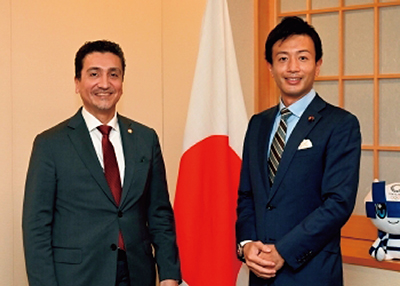
Parliamentary Vice-Minister for Foreign Affairs Suzuki receiving a courtesy call from Mr. Rául Florentín Antola, Ambassador of Paraguay to Japan (November 2020)
Latin America and the Caribbean have also been drawing attention in recent years as a production base and market for industries, attracting many Japanese corporations into the region. From the perspective of developing a foundation for the development of Latin American and Caribbean countries, Japan is also actively engaged in developing water supply and sewerage infrastructure in metropolitan regions and the countryside. In August 2020, Japan and Paraguay exchanged notes on the provision of an ODA loan amounting to ¥9.13 billion, which will improve living conditions through providing safe and efficient water supply and sewerage services.
In addition, Japan has also worked on spreading Japan’s terrestrial digital broadcasting system (ISDB-T format) through public-private collaboration, particularly in Latin American and Caribbean countries. As of December 2020, 14 countries in Latin America and the Caribbean adopted the Japanese system. Toward these countries, Japan provides support for technology transfer to enable the smooth introduction of the system, and also carries out human resources development to this effect.
... Initiatives in the Areas of Medical Care and Sanitation, Education, and Others
Japan also provides various kinds of cooperation for Latin American and Caribbean countries in the fields of medical care and sanitation. In this region, due to the underdeveloped medical system, non-communicable diseases, infectious diseases such as HIV/AIDS and tuberculosis, and tropical diseases are still serious public health concerns. Furthermore, due to the spread of COVID-19 in 2020, establishing a medical system for rapid and accurate diagnosis and treatment is required.
Under these circumstances, Japan signed and exchanged notes on grant aid totaling ¥7.9 billion with 18 Latin American and Caribbean countries in 2020, based on the requests of each government for the provision of health and medical equipment to support the response to COVID-19. In addition, Japan provided a total of approximately ¥200 million in health and medical equipment to 17 countries in the region through existing technical cooperation and grant aid. Furthermore, as for El Salvador, through the Stand-by Loan for Natural Disaster Recovery, which was signed in 2015, ¥5 billion was disbursed to support the response to COVID-19. In addition to bilateral cooperation, Japan has contributed ¥300 million to the Pan American Health Organization (PAHO) and also provided assistance for capacity building and supplies through the Japanese Trust Funds at the Inter-American Development Bank (IDB).
Furthermore, in El Salvador, Japan is engaged in a joint research for identifying virulent factors and developing therapeutic drugs for Chagas disease, which is a parasitic disease considered to be a serious tropical disease next to malaria in Latin America and the Caribbean. In the area of sanitation, Japan has conducted numerous projects to assist in the development of water and sewerage systems in order to ensure the supply of safe drinking water and the recycling of domestic water.
Nikkei communities have formed in various countries in Latin America and the Caribbean. Japan has continued its efforts to support these communities such as providing support for the welfare facilities of the Nikkei communities, accepting trainees, and dispatching Japan Overseas Cooperation Volunteers (JOCVs).
Moreover, assistance in the field of education is extremely important for Latin American and Caribbean countries, due to the existence of poverty and insufficiencies in their educational budget. Japan has provided support for building basic educational facilities including through the grant aid “Project for Construction of Basic Schools in Centre and Artibonite Departments” to Haiti. Japan also implemented technical cooperation projects and dispatched volunteers to improve the capacity of teachers. Such efforts are highly appreciated by the local communities.
... South-South Cooperation and Cooperation with Regional Organizations
Brazil, Mexico, Chile, and Argentina have achieved results in South-South cooperation*, and Japan has signed partnership programs with these countries. Based on such partnerships, Japan is collaborating with Argentina, for example, to provide assistance to small and medium-sized enterprises (SMEs) in Latin America, as well as in Africa. In Chile, Japan is conducting human resources development programs through triangular cooperation in the field of disaster risk reduction and has succeeded in training 5,169 people, exceeding the initial target of 4,000. In Brazil, with many years of cooperation from Japan, the Japanese-style community policing system has become wide-spread. Utilizing this experience regarding the community policing system, and based on the framework of triangular cooperation, Brazilian experts in the field of community policing are currently dispatched to Central American countries to conduct technology transfers. Activities are also underway in Mexico to share the achievements of Japan’s cooperation to date with other Latin American and Caribbean countries, mainly in the fields of health and medical care.
Furthermore, Japan is also cooperating with the Central American Integration System (SICA), the Caribbean Community (CARICOM), and other regional organizations to formulate projects that cover the entire region, in order to achieve a more effective and efficient development cooperation related to development issues that are shared throughout the Latin American and Caribbean region.
... Assistance for Central American Migrants and Venezuelan Refugees and Migrants
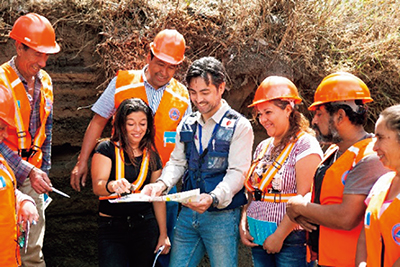
A JICA expert giving guidance to local residents in volcanic foothill areas of Guatemala in their disaster risk reduction activities (Photo: JICA)
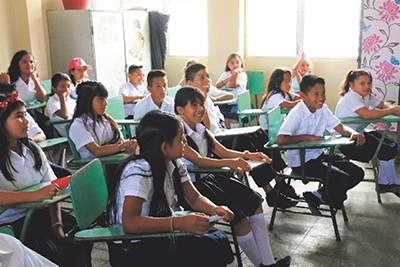
Students learning at the Dr. Marco Aurelio Soto Center for Basic Education in Siguatepeque, Comayagua department, Honduras, which was expanded and renovated to improve the learning environment through the Grant Assistance for Grass-Roots Human Security Projects
Central America faces the issues of migrant caravans aiming to immigrate to the United States and Mexico, fleeing poverty and insecurity. In 2020, in cooperation with the International Organization for Migration (IOM) and WFP, Japan provided assistance to Mexico, Guatemala, El Salvador, and Honduras for the promotion of voluntary repatriation of migrants, prevention of outflow of migrants, and social reintegration of returned migrants in Central America.
Moreover, due to the recent deterioration of the economic and social conditions in Venezuela, approximately 5.4 million Venezuelan refugees and migrants have flowed mainly to neighboring countries as of December 2020. This has caused the deterioration of the living conditions of local residents in the areas that received refugees and migrants and instability of the region. The fact that the situation has not been dealt with sufficiently has become a challenge. In March 2020, with regard to Brazil, Colombia, Ecuador, and Peru, which have been receiving displaced Venezuelan people, Japan decided to extend Emergency Grant Aid through the Office of the United Nations High Commissioner for Refugees (UNHCR) and IOM for protection for vulnerable people, food assistance, and social integration support such as vocational training. Furthermore, in May 2020, then State Minister for Foreign Affairs Suzuki attended the International Donor’s Conference in Solidarity with Venezuelan Refugees and Migrants and exchanged views on the efforts of each country on Venezuelan refugees and migrants, which has become a serious issue in the neighboring countries as well as the region. In December 2020, through the United Nations Children’s Fund (UNICEF), Japan decided to provide assistance for vaccinations for children and expectant and nursing mothers, including returned migrants and internally displaced people, as well as the capacity building of medical care workers in Venezuela (see “Stories from the Field” for details).
Glossary
- *South-South cooperation (Triangular cooperation)
- South-South cooperation refers to cooperation provided by relatively advanced developing countries to other developing countries, utilizing their own development experiences, human resources, skills, funds, and knowledge. In many cases, the cooperation, primarily technical cooperation, is conducted in countries that have similar natural environments, linguistic, cultural, and economic circumstances, and/or are facing similar development processes. When supported by donors or international organizations, such South-South cooperation between developing countries is referred to as “triangular cooperation.”
